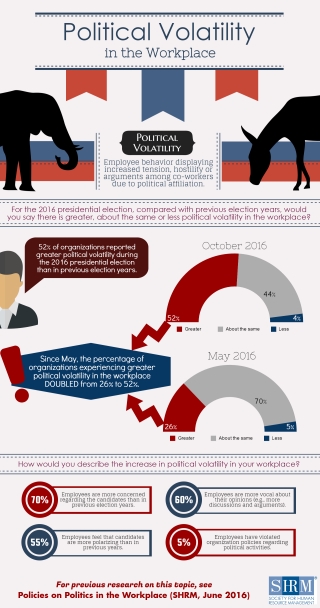Election Causes Emotions to Run High at Work
 A Society for Human Resources (SHRM) survey found more "political volatility" at work than in previous election years. The rate is up from another SHRM survey conducted in June. Respondents said that employees are more concerned this year about the candidates and more vocal about their opinions.
A Society for Human Resources (SHRM) survey found more "political volatility" at work than in previous election years. The rate is up from another SHRM survey conducted in June. Respondents said that employees are more concerned this year about the candidates and more vocal about their opinions.
This infographic summarizes the survey responses.
Politics are part of life, and perhaps this is just part of "bringing your whole self to work," which we discuss in Chapter 2 of the tenth edition. Or should we avoid talking about politics in the workplace?
Although these conversations may be uncomfortable, a Harvard Business Review article quotes Joseph Grenny, coauthor of Crucial Conversations:
"[Y]ou spend the majority of your waking hours with your colleagues, and so it's natural to "feel the need to process your thoughts and feelings" with them. In fact, he says, learning how to talk about politics in a productive manner can help you "manage other difficult conversations at work," including peer performance reviews or disagreements over strategy and policy. Politics is just another topic where "emotions run strong, the stakes are high, and opinions vary," he says.
The article suggests strategies for managing political discussions at work, for example, viewing them as an opportunity to learn more about each other, focusing on the process instead of a candidate, and knowing when to "disengage."
Discussion Starters:
- What's your view? Should we avoid talking about politics at work, or is it an opportunity for building a better team?
- Have you been in an awkward or frustrating situation with a coworker about a political situation? How did you handle it, and what did you learn?
- What do you think will happen after this year's election? Will we all go back to normal, or is that just wishful thinking?
